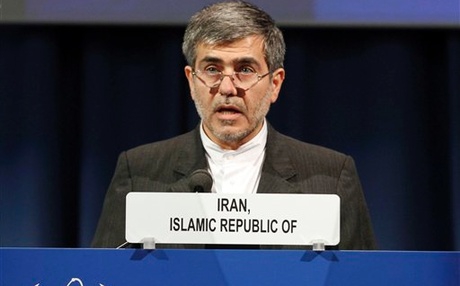Tuesday 18 September 2012 - 12:28
Story Code : 5848
Iranian official says blasts targeted nuclear sites
WASHINGTON ��Iran�s most senior atomic energy official revealed on Monday that separate explosions, which he attributed to sabotage, had targeted power supplies to the country�s two main uranium enrichment facilities, including the deep underground site that American and Israeli officials say is the most invulnerable to bombing.
The official, Fereydoon Abbasi, a nuclear scientist who�narrowly escaped an assassination�in his car nearly two years ago, just before he was appointed to lead the Atomic Energy Organization of Iran, said one of the attacks occurred on Aug. 17, a day before international inspectors arrived at the underground site.
The most recent�report by the International Atomic Energy Agency, the United Nations arm that conducts the inspections, said nothing about power cutoffs. On Monday, a spokesman for the agency would not comment on whether power to the site had been disrupted.
There was no way to verify Mr. Abbasi�s assertions; he also contended that the I.A.E.A. had been infiltrated by �terrorists and saboteurs,� suggesting they were responsible for the attacks. But if they were acts of sabotage, as he claimed, they would raise the question of whether Israel, the United States or some groups within Iran had moved beyond cyberattacks to take other steps, short of a military attack, to disable Iran�s nuclear fuel plants.
Mr. Abbasi�s accusations, in a speech at an I.A.E.A. conference in Vienna, come as Prime Minister Benjamin Netanyahu of Israel has been�pressing the Obama administration to establish �red lines��of intolerance for Iran�s nuclear activities.�Mr. Netanyahu said on Sunday�that Iran was only six or seven months away from having the fuel to make a quick dash for a nuclear weapon, a clear reference to the activity at Fordow, the underground site near the holy city of Qum.
That site was one of the two that Mr. Abbasi said had been struck.
Mr. Abbasi said that on Aug. 17, power lines from Qum to the Fordow site �were cut using explosives.� He also said a �power outage is a way of damaging centrifuge machines.� He said I.A.E.A. officials had requested �a snap inspection of the facility� early the next day.
He did not say what damage the attack might have done. Asked by reporters at the conference to elaborate, he was quoted by The Associated Press as saying backup batteries and diesel generators had prevented disruptions to the centrifuges, which are vulnerable to damage from abrupt changes in the power supply.
Fordow is the newest known plant in Iran�s uranium enrichment program, which Western countries suspect is a cloak for developing the capacity to make atomic bombs despite Iran�s repeated denials.
Mr. Abbasi said a similar attack had hit Natanz, an older plant where most of Iran�s enrichment has taken place. But he gave no date.
A number of years ago, power supplies installed under centrifuges at Natanz blew up, and Iran claimed American sabotage was the cause. Other components for the program have been tampered with, in at least one case at an American nuclear laboratory, before they were delivered.
In January 2009, The New York Times reported that President George W. Bush, at the end of his second term,�authorized a program�to undermine electrical and computer systems and other networks on which Iran relies. In June of this year it reported that program had turned into �Olympic Games,� a covert effort, focused on cyberattacks on the Natanz plant, that was�expanded by President Obama. That effort became apparent in the summer of 2010, when one of the computer worms, later called�Stuxnet, was replicated around the world because of a programming error. But the Fordow plant was apparently not a target of that effort.
Mr. Abbasi�s criticism of the I.A.E.A. came a few days after the agency chastised Iran for rejecting repeated demands to halt its centrifuges, as the United Nations Security Council has demanded, and to allay the agency�s concerns about evidence that Iran had done�nuclear weapons�research.
The Iran Project is not responsible for the content of quoted articles.
# Tags











